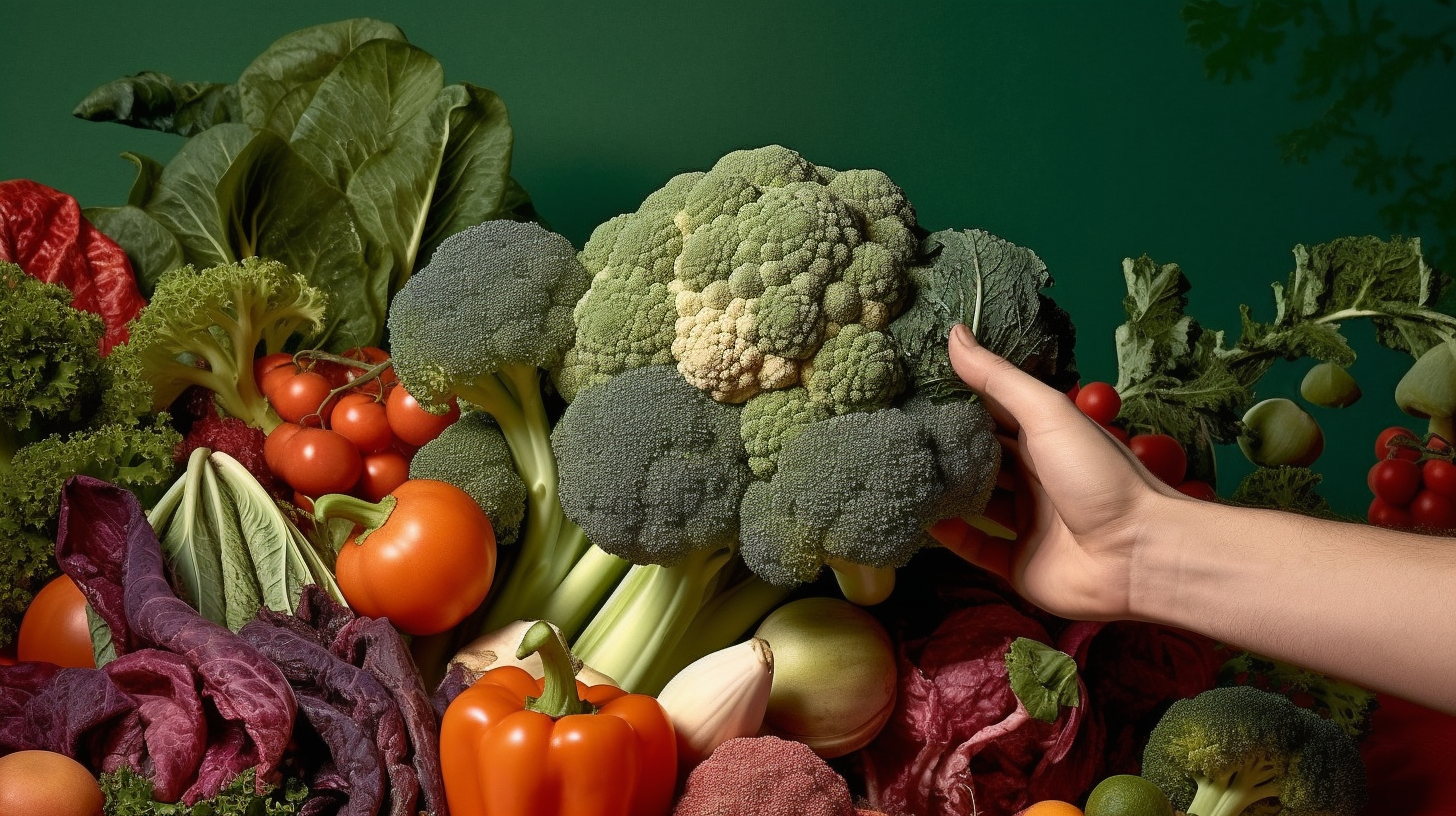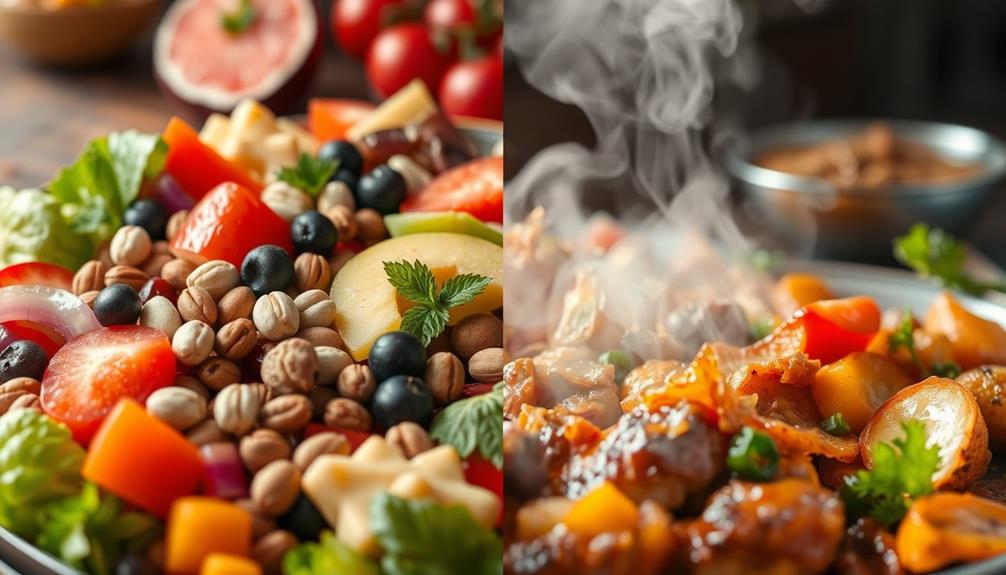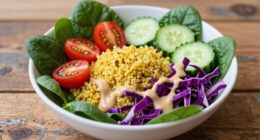Eating a healthy diet is crucial for our well-being. But with so many different diets and opinions out there, finding the right one for you can be tough.
One of the most popular trends in nutrition today is raw foodism – consuming uncooked foods as part of your regular meals. So, what does the research say about eating raw? Is this really a healthier lifestyle choice?
In this article, I’ll take a look at whether or not raw food offers any real health benefits.
Benefits Of Eating Raw
Eating raw food can be a great way to get all the essential nutrients your body needs while staying healthy. Raw foods offer many benefits, such as improved digestion and more energy throughout the day. Plus, if you’re looking for a sustainable dietary lifestyle that’s easy to maintain on-the-go, a plant based diet of mostly raw foods is an excellent option!
Raw travel also allows you to save money in the long run since most pre-prepared meals are more expensive and less nutrient dense than those made from scratch at home.
Eating fresh fruits and vegetables helps reduce packaged goods waste, which supports environmental sustainability efforts. Additionally, it’s much easier to find simple, cost effective snacks like nuts or apples when out and about compared to processed alternatives.
When considering whether eating raw food is healthier, one must look no further than the nutrient content of said foods. Vitamins A, C, E, K and B complex vitamins are found in abundance within unprocessed plant sources – these micronutrients play key roles in everything from immune health to skin regeneration.
Minerals like calcium, potassium, magnesium and iron are also readily available in many types of produce; they help support strong bones and teeth as well as maintaining proper cardiovascular functioning.
With so much focus placed upon obtaining sufficient nutrition through consuming whole foods rather than heavily processed substances nowadays, raw diets continue to rise in popularity among people who want to stay healthy without sacrificing taste or convenience.
Nutrient Content Of Raw Foods
Raw foods have the potential to be incredibly nutrient-dense. They contain vitamins, minerals, and other compounds that are essential for optimal health. Many of these nutrients are more easily absorbed when consumed in their raw form, allowing your body to absorb them without having to break down any cooked food components. Plus, raw foods often require less preparation time and energy than cooked meals.
However, there’s still a great deal of debate around whether or not eating raw is actually healthier overall.
Food storage also plays an important role in determining the nutritional content of our diets. Raw fruits and vegetables can quickly lose some of their valuable nutrients due to exposure to oxygen while they’re stored and transported from farm to grocery store shelves. This means that even if you opt for fresh produce, it may not provide as much nutritional value as you expect—especially if it has been sitting on the shelf or in transport for a long period of time.
Additionally, many people find it difficult to consume enough variety in their diet when relying solely on raw fruits and vegetables as sources of nutrition.
Ultimately, if you choose to incorporate more raw ingredients into your diet, look out for signs that indicate high quality produce such as firmness and bright colors with no blemishes or bruises. With this approach, you can ensure that you’re getting maximum amounts of key nutrients without sacrificing taste or texture – all while minimizing health risks associated with consuming too many processed foods!
As we move forward towards exploring the health risks associated with eating raw food, let’s keep these considerations at the forefront of our minds before making any dietary decisions.
Health Risks Of Raw Foods
Eating raw foods can be a great way to get all the essential nutrients, but there are a few risks to be aware of.
Food-borne illnesses, such as salmonella and E.Coli, can be contracted if raw foods aren’t handled and stored properly.
Nutritional deficiencies can occur if you rely too heavily on raw food diets, as cooking can make some foods more digestible and easier to absorb.
Food poisoning is another potential risk, as raw foods may contain harmful bacteria that can be killed during the cooking process.
So, if you’re thinking of incorporating more raw foods into your diet, be sure to be mindful of the potential risks.
Food-Borne Illness
The thought of food-borne illness can be a terrifying one. When it comes to eating raw foods, the risk for contracting something like E. coli becomes even higher. That’s why it’s so important to adhere to strict food safety guidelines and storage protocols when preparing meals with uncooked ingredients!
When purchasing raw produce, make sure you check labels for expiration dates and wash everything thoroughly before consumption.
It’s also recommended that you keep certain items separate from other foods in your fridge; meats should never come into contact with fruits or vegetables if they’re not cooked first.
And if you plan on marinating anything, don’t use the same utensils as those used for serving unless they’ve been washed between uses!
By following these simple steps, you can reduce your chances of getting sick while still enjoying all the deliciousness that comes with consuming raw dishes.
With just a little extra effort and attention to detail, anyone can enjoy fresh ingredients without risking their health?
Nutritional Deficiencies
While eating raw foods may be a healthier alternative to cooked meals, it can also lead to nutritional deficiencies if not done right. That’s why it’s important to understand the different cooking methods when preparing uncooked dishes and pay attention to food safety guidelines.
For example, while boiling is one of the most popular ways to cook vegetables, steaming them will actually help preserve more nutrients than other methods – so make sure you take that into account when deciding how best to prepare your ingredients!
Additionally, consuming too much raw animal protein like fish or eggs could potentially lead to a Vitamin B12 deficiency, so supplementing with fortified foods might be necessary.
Overall, eating raw foods can still offer many health benefits despite potential risks; as long as proper precautions are taken and everyone keeps their diet varied enough for maximum nutrient intake, there’s no reason why anyone can’t enjoy fresh produce without worry.
It just takes extra awareness and diligence in order to ensure safe consumption – but thankfully, that doesn’t have to mean sacrificing taste either!
Food Poisoning
No one likes getting sick – especially from food poisoning, which is why it’s important to take extra precautions when eating raw foods.
Spoiling prevention and food safety are two of the most crucial elements in making sure your meals don’t make you ill; for instance, keeping your ingredients refrigerated at all times will help reduce the risk of bacteria growth.
Additionally, always washing your fruits and vegetables before preparing them can also go a long way toward avoiding potential sicknesses. Moreover, never consuming any uncooked animal proteins like fish or eggs unless they come from reputable sources and have gone through proper pasteurization processes should be strictly adhered to as well.
Keeping these guidelines in mind while cooking with fresh produce can help ensure that no one has to worry about their health being compromised due to food-borne illnesses. Ultimately, taking these necessary steps won’t only give peace of mind but also allow everyone to enjoy the deliciousness that comes with eating raw ingredients without having to compromise on taste!
Achieving Nutritional Balance With Raw Food
Eating raw food is becoming an increasingly popular lifestyle choice. It’s a great way to get more vitamins, minerals and antioxidants into your diet, as well as increase the amount of fiber you’re consuming.
Many people are drawn to raw food because it requires minimal preparation and cooking time – plus it’s easy on the budget! But there’s more to eating raw than just convenience and nutrition; it can also help us achieve nutritional balance in our lives.
Eating habits such as skipping meals or overeating can lead to unhealthy weight gain, fatigue, and even mood swings. By making sure that at least some of our daily intake comes from fresh fruits and vegetables rather than processed foods, we can ensure that our bodies receive balanced nutrition while avoiding excess calories or fat.
Raw diets don’t have to be all-or-nothing either: incorporating a few servings of uncooked veggies or greens each day is often enough to make a difference in improving overall health. Incorporating raw foods into your eating routine doesn’t have to mean major changes in lifestyle – small steps like adding salads or smoothies can go a long way towards bettering your wellbeing.
With these simple tips, anyone can enjoy the benefits of adding more unprocessed whole foods into their diet without sacrificing flavor or variety.
Next up, let’s take a look at the digestive benefits of eating raw…
Digestive Benefits Of Eating Raw
I’m sure you’ve heard about the digestive benefits of eating raw food – from the presence of enzymes to the easier absorption of nutrients.
Well, I’m here to tell you that it’s true!
Eating raw food means that those enzymes are still active and ready to help break down food, increasing nutrient absorption.
Plus, some vitamins and minerals are better absorbed in the presence of fat, which is present in raw foods.
Needless to say, eating raw can have a real impact on your digestive health!
Enzymes
When it comes to the digestive benefits of eating raw, enzymes are key.
Raw foods contain more active enzymes than cooked ones, and these live proteins play an important role in digestion.
When you eat a food that contains its own enzyme activity, like raw fruits and vegetables, your body can use those enzymes for digestion instead of relying on your pancreas to produce them.
This means easier digestion with less strain on your system!
Plus, when you ferment or sprout raw foods, even more active enzymes become available since the fermentation process breaks down complex carbohydrates into simpler forms that are easier for our bodies to digest.
The result? A huge boost in digestion power courtesy of those wonderful natural enzymes found only in raw foods!
So if you’re looking to get the most out of what you eat while taking care of your gut health at the same time, make sure to include plenty of unprocessed raw ingredients in your diet – they’ll do wonders for helping keep everything running smoothly.
Nutrient Absorption
Eating raw foods isn’t just good for digestion, it can also give your body a powerful nutrient boost. That’s because eating uncooked fruits and vegetables preserves most of the vitamins and minerals that are often destroyed during cooking, meaning you get all the nutrition without having to worry about losing any in the process.
Plus, when you ferment or sprout raw ingredients, even more beneficial compounds become available since they’ve been broken down into simpler forms that our bodies can absorb better.
But if you’re not sure how to make raw food part of your regular diet, there are plenty of creative substitutes out there! You could try swapping salads for cooked side dishes, adding fresh herbs to marinades for extra flavor, or finding ways to incorporate more smoothies and juices into meals – basically anything that allows you to enjoy the nutritional benefits of eating unprocessed foods while still getting some variety.
Just be mindful of which cooking methods you choose though – steaming is one way to preserve many of those vital nutrients while still making your meal easier on the digestive system. So as long as you keep an eye out for healthy options like this, enjoying all these great dietary benefits from eating raw should be simple enough!
Potential Benefits Of Eating Raw For Weight Loss
Eating raw food can be a great way to lose weight, without compromising on nutrition and taste. Raw meal planning helps you make sure that your meals are well-balanced and provide all the nutrients that your body needs while also supporting sustainable sourcing practices. Planning out what you’re going to eat beforehand takes away any guesswork and simplifies the process of making healthy decisions when it comes to eating.
Raw foods are generally packed with essential vitamins and minerals, as they have not been processed or cooked in any way. These nutritious ingredients help keep you feeling full for longer periods of time than those who consume mostly processed snacks or fast food items.
Furthermore, fresh fruits and vegetables contain powerful antioxidants that help protect against diseases such as cancer. Eating raw also means avoiding additives like sugar, salt, preservatives, artificial colors, flavors and more – all of which are linked to various illnesses over time if consumed regularly in large quantities.
The advantages of eating raw don’t end there; since plant-based sources tend to require less energy to digest than animal proteins, this type of diet is much easier on the digestive system. Additionally, by including natural sources of dietary fiber into one’s daily meals, regular bowel movements become easier to achieve and maintain—a definite plus for overall health!
Transitioning from an unhealthy lifestyle (such as consuming too many processed foods) to a healthier one involving whole raw foods can truly lead to improved wellbeing in both mind and body. As we move forward into exploring how raw diets affect detoxification processes within the body…
Raw Food Diets And Detoxification
Eating raw foods such as fruits, vegetables, nuts, and seeds can be incredibly beneficial for our health. Raw foods are packed with vitamins, minerals, antioxidants, and phytonutrients that help to detoxify our bodies.
Eating a raw food diet can give us more energy, help with weight loss, and improve our skin health. But it can be a challenge to get enough variety in our diet and to make sure we’re getting all the nutrients we need.
That’s why it’s important to do research and consult a nutritionist when starting a raw food diet. Detoxifying with raw foods can be an effective way to cleanse our bodies, but it’s important to remember that it takes dedication to keep up with the diet and consult your doctor if you have any concerns.
Benefits Of Raw Foods
Raw foods have long been associated with detoxification and improved wellbeing. Eating unprocessed, plant-based ingredients is an easy way to get the nutrients that your body needs without having to worry about added fats or preservatives.
Raw foods can be prepared in a variety of ways – juicing, blending, dehydrating, sprouting – all of which help keep their natural nutrient content intact and make them easier for our bodies to digest.
The benefits of eating raw are numerous: it allows us to maximize nutrition from fruits and vegetables by preserving essential vitamins, minerals, and enzymes; it reduces exposure to harmful toxins often found in processed food; and it increases fiber intake as well as antioxidant levels.
Additionally, consuming fresh produce helps improve digestion since cooked foods can take longer for our digestive systems to process.
By following a diet rich in raw food instead of relying on heavily processed options, you’ll not only see improvements in overall health but also enjoy more energy throughout the day.
With just a little creativity in the kitchen you can unlock the power of these wholesome ingredients while still enjoying delicious meals!
Detoxification With Raw Foods
Raw food diets are becoming increasingly popular, especially for those looking to detoxify their bodies. Juicing raw fruits and vegetables is an effective way to get the necessary nutrients in a concentrated form while still preserving essential vitamins, minerals and enzymes.
Additionally, veganism has become more accepted as people recognize its many benefits – including improved digestion and increased antioxidant levels. By embracing raw foods you can reap all of these rewards without sacrificing flavor; with just a little creativity in the kitchen you’ll be able to enjoy delicious meals that keep your body healthy!
Challenges Of Raw Diets
Although raw diets can be beneficial for detoxifying your body, there are some challenges that come with it.
For one thing, it can take a lot of preparation to get the most out of a raw diet – you have to make sure all ingredients are fresh and properly stored.
Additionally, eating mostly raw foods may not provide enough nutrients in the long run; if you don’t supplement with other sources like beans or nuts, then you might miss out on important minerals and vitamins.
The final challenge is sustainability – while the initial enthusiasm for going raw may be strong, maintaining this type of lifestyle over time requires dedication and planning.
That said, by combining mindful cooking skills with knowledge of nutrition science, anyone can find ways to enjoy delicious meals while still keeping their bodies healthy!
Effectiveness Of Raw Food Diets For Athletic Performance
Feeling energetic and being able to recover quickly are the foundations of successful athletic performance, so what role can raw food diets play?
Eating unprocessed whole foods is thought to be beneficial for athletes due to its potential benefits on energy levels, activity levels, and recovery time.
Like ripples in a pond, these effects have far-reaching implications that can impact long term health.
Raw food diets provide an abundance of vitamins, minerals, antioxidants, fiber, and other essential nutrients that help support optimal training performance and quick recovery from hard physical exercise.
It also gives athletes access to an array of healthy fats which may enhance endurance capacity by providing fuel during prolonged activities.
In addition to this, eating mostly uncooked fruits and vegetables could reduce inflammation related to intense workouts as well as aid in muscle building processes by supplying ample amounts of protein.
Alongside promoting better overall health with nutrient dense ingredients like leafy greens or nuts, following a raw food diet also helps maintain steady blood sugar levels between meals which reduces cravings for sugary snacks.
This ensures athletes stay energized throughout their workout sessions without any ‘energy dips’ caused by poor dietary choices.
While there are many advantages associated with consuming more natural plant-based fare over processed convenience foods it is important to know how much variety you need in order to meet your personal goals while avoiding deficiencies or nutrient overloads.
Moving forward let’s explore the effects of raw food diets on blood sugar management.
Raw Food Diets And Blood Sugar Management
Many people believe that eating raw food is healthier, and there’s some evidence to support this. For one thing, it can help maintain healthy blood sugar levels by providing a range of raw snacks throughout the day.
Eating fruits and vegetables in their natural state maximizes the nutrient content and provides essential vitamins and minerals for optimal health. In addition, consuming uncooked foods helps strengthen the immune system because much of the nutritional value is retained during preparation.
Raw diets also offer other potential benefits such as weight loss or improved digestion due to an increased intake of fiber from plant-based sources. By avoiding cooked meals, you may be able to lower your risk of certain types of chronic diseases like diabetes or heart disease.
The key is finding ways to incorporate raw ingredients into your diet without sacrificing flavor or texture. Fortunately, there are plenty of recipes out there featuring fresh produce that taste great and provide excellent nutrition with every bite.
As you explore what works best for your individual needs, keep in mind how important it is to practice safe handling techniques when preparing raw foods at home to reduce your risk of foodborne illness. Moving forward we will discuss these details further as we examine raw food diets and risks associated with them.
Raw Food Diets And Risk Of Foodborne Illness
Raw food diets are becoming increasingly popular for their perceived health benefits, but there is still a lack of clear evidence to support these claims. Despite the health implications being uncertain, one risk that cannot be denied is the potential for foodborne illness when eating raw foods.
It’s important to understand how to safely handle and prepare raw ingredients before consuming them; proper labeling should also be taken into consideration. Food safety must always come first when preparing any meal, especially those that include raw foods or partially cooked items.
For this reason, it’s essential to ensure all products used in preparation have been properly stored, labeled and handled according to FDA guidelines. Clear labels on packaging can help identify potentially contaminated items which may pose a threat if consumed without cooking thoroughly. Additionally, cross-contamination should be avoided by washing hands frequently and keeping surfaces clean while prepping meals.
With the right precautions taken prior to consumption, risks associated with foodborne illnesses from raw foods can be minimized. The next step is exploring the relationship between raw food diets and inflammation – an area where more research needs to be conducted in order to draw definitive conclusions about its effects on overall health.
Raw Food Diets And Inflammation
Eating raw food is often seen as a healthier alternative to cooked meals. The advantages of plant-based eating and food combining are widely touted, but there may be some hidden costs in terms of inflammation.
Recent studies have suggested that the consumption of certain raw foods can cause an inflammatory response in the body. One example of this is when people consume too many high oxalate fruits like blackberries or raspberries on an empty stomach. This could lead to an increase in free radicals and other oxidative damage which can trigger inflammatory responses.
Additionally, some raw vegetables such as kale and spinach contain compounds called glucosinolates which can also contribute to inflammation if consumed in excess amounts over time. In addition, raw diets tend to lack important vitamins and minerals due to their limited variety and reliance upon unprocessed ingredients.
Without adequate levels of these key nutrients, our bodies cannot function optimally resulting in decreased energy levels, weakened immunity, and increased risks for diseases related to chronic inflammation. It’s clear that while raw diets offer many potential benefits, it’s important to take into consideration the role of inflammation before diving head first into any new diet trend.
Moving forward then, let’s explore what kind of financial impact following a raw diet might have…
Cost Of Eating Raw
I’m sure you’ve heard the buzz about eating raw food as a healthier way of life, but what about the cost of going raw? Organic produce can be expensive, so it’s important to consider the effect it will have on your grocery budget.
How cost-efficient is it to eat raw? Let’s take a closer look. I’m here to break down the pros and cons of the cost of eating raw to help you decide if it’s the right choice for you. From understanding the cost of organic produce to considering the impact on your budget, I’ll help you make an informed decision.
Eating raw can be pricey, but it doesn’t have to break the bank. Let’s explore the cost of going raw.
Cost Of Organic Produce
Eating raw food can be expensive, especially if you prioritize organic produce. Shopping around for the best prices and taking advantage of weekly specials is my top strategy when it comes to buying organic fruits and vegetables on a budget.
If I find an especially good deal on something that’s in season, like apples or peaches, I’ll buy more than usual and store them properly so they last longer – this way I don’t have to shop as often! Storage tips include keeping your produce away from direct sunlight and rinsing off any dirt before storing it in airtight containers with damp paper towels. This helps keep everything fresh until you’re ready to eat it.
With careful shopping strategies and proper storage techniques, eating raw can still fit into even the tightest budgets.
Effect Of Eating Raw On Grocery Budget
Eating raw can be a great way to save money on groceries, if you know how to make it work for your budget.
Affordability trade-offs are necessary – do I buy organic or non-organic produce? Is it better to buy in bulk and freeze what I won’t use right away? There’s also the option of cooking some of my food instead of eating everything raw – this is typically more affordable than buying all organic produce.
Finding ways to balance these affordability trade-offs with healthy eating habits will help keep your grocery bill down while still providing nutritious meals.
It may take time and experimentation to figure out which strategies work best for you, but don’t give up!
Shopping around for the best prices and taking advantage of weekly specials is key when trying to eat raw on a budget.
If you find an especially good deal on something that’s in season, like apples or peaches, try stocking up so you have enough until the next sale rolls around.
By carefully managing your grocery spending and making smart decisions about the food you purchase, you’ll soon find yourself enjoying delicious raw meals without breaking your bank account!
Cost-Efficiency Of Eating Raw
Eating raw is not only cost-efficient but it can also save you time and help reduce your environmental impact.
By avoiding processed foods and sticking to fresh produce, you’ll find that you’re able to make meals quickly with minimal effort.
Additionally, because organically grown food typically has a smaller carbon footprint than conventionally produced items, choosing organic ingredients will further decrease the environmental costs of eating raw.
Shopping around for good deals on seasonal produce means you get both quality and affordability without sacrificing nutrition or taste.
And because there’s no need to spend extra time cooking up complicated meals, eating raw allows for more free time in the day – something we all can appreciate!
All this adds up to an overall cost-effective experience that helps keep your wallet happy while helping the planet too.
Tips For Eating Raw
Switching from cooked food to a raw diet can be daunting, but it doesn’t have to be. After all, consuming raw food is not only healthier for you; it’s also an opportunity to get creative!
To make the transition easier and help you discover new snacks that are beneficial for your health, here are some tips:
- Storage: Raw foods should always be stored properly in order to prevent spoilage and contamination. Be sure to store fruits, vegetables, legumes and nuts separately in airtight containers at room temperature or in the refrigerator (if necessary).
- Fruits: Fruits tend to ripen quickly so they need special attention when storing. Store most fruits on kitchen counters away from direct sunlight. Bananas will last longer if kept apart from other fruits because of their ethylene production.
- Vegetables: Most vegetables should be kept refrigerated until ready for consumption. It’s important to keep them dry before placing them into bags or containers as moisture increases the chance of bacterial growth leading to spoilage.
- Legumes & Nuts: Legumes such as beans, lentils and peas need to stay dry while stored since humidity can cause mold growth which would render them unsafe for eating. Nuts should also remain stored in a cool place like your pantry or refrigerator since warm temperatures accelerate rancidity.
- Snacks: Eating a variety of raw snacks throughout the day is essential for maintaining energy levels and getting enough nutrients. Consider having apples with peanut butter or hummus-filled celery stalks as mid-morning snacks followed by chopped carrots with ranch dip later in the afternoon—or any combination of fresh fruit, veggies and legume/nut dishes that suit your taste buds!
Armed with these helpful storage tips and snack ideas, transitioning towards a raw lifestyle becomes more manageable — no matter how busy life gets! So why wait? Start exploring different recipes today and enjoy the benefits of living a healthier lifestyle through eating raw food!
Raw Food Recipes
I’ve been exploring the health benefits of raw food for a while now, and I’m convinced that eating more fresh fruits and vegetables is the way to go. Meal planning with raw ingredients can be challenging at first but it’s worth it in the end!
With some creativity and practice, you’ll soon find yourself coming up with delicious combinations – think crunchy salads, colorful smoothies and nutritious soups. Raw snacks are also an excellent way to keep your energy levels high throughout the day. Nuts, berries and even homemade nut bars make great options as they’re all full of nutrients and easy to prepare.
Raw food doesn’t have to be boring either; there are plenty of recipes out there that will tantalize your taste buds! Think about adding spices such as cayenne pepper or turmeric for extra flavor and nutrient-rich superfoods like spirulina and chlorella for a tasty boost. You could also try experimenting with different textures by blending nuts into creamy spreads or making creative veggie wraps. The possibilities really are endless!
Making healthy choices isn’t just about what we eat; it’s also important to consider where our food comes from too. That being said, let’s take a look at some resources available when transitioning towards a healthier lifestyle…
Raw Food Resources
Eating raw food is like taking a dive into an unexplored culinary world. From fresh fruits and veggies to nut milks and spreads, there are endless possibilities when it comes to preparing delicious meals without the need for cooking.
When done right, eating raw can be just as healthy – if not healthier – than cooked food, making it an attractive option for anyone looking for more nutrition in their diet. The key to getting the most out of your raw recipes is finding substitutes that will provide satiation and flavor but still maintain nutritional value; things like nuts, seeds, legumes and seaweed are all great replacements for animal proteins or dairy products.
Additionally, there’s no shortage of creative cooking methods you can use to make sure your meal looks as good as it tastes – try dehydrating vegetables with herbs or spices to add texture and crunch! You could also whip up some homemade sauces using blended cashews or avocados, or even learn how to ferment foods such as cabbage or mushrooms.
Raw food offers plenty of benefits: fiber-rich plants provide essential vitamins and minerals while keeping our bodies fueled throughout the day. Eating this way helps balance hormones naturally due to fewer processed ingredients being consumed overall. Plus, going without heat allows us to preserve vital enzymes in certain foods which aid digestion and absorption of nutrients within the body– something that wouldn’t happen if we were cooking them first.
All these factors come together to create a nutritious lifestyle that has countless positive effects on our health!
Frequently Asked Questions
Does Eating Raw Food Require A Lot Of Preparation?
When it comes to eating raw food, preparation is key.
Portion control and food safety are essential for any diet plan, but especially when consuming uncooked foods.
While some people may think that preparing raw food requires more effort than other diets, the truth is that with a few simple steps you can easily create an enjoyable meal without much extra work.
To ensure your meals are safe, portion out ingredients carefully before cooking or blending them together; this will help prevent over-consumption of certain items and make sure the entire dish tastes balanced.
Additionally, be mindful about where you get your produce from – always purchase high quality products to guarantee their nutritional benefits and keep yourself healthy!
How Much Of A Raw Food Diet Should I Incorporate Into My Diet?
Eating out can be tricky when you’re incorporating a raw food diet into your lifestyle. However, it’s important to remember that eating raw doesn’t have to take up the majority of your diet in order for you to reap its benefits.
In fact, experts suggest adding 1-2 days of raw foods per week is enough to start feeling healthier.
When preparing and storing your meals at home, make sure to handle food safely by using separate cutting boards and utensils for cooked and uncooked foods, as well as refrigerating items promptly after preparation.
Is Raw Food Cheaper Than Cooked Food?
The age-old adage, ‘you get what you pay for’, certainly rings true when it comes to raw food.
Generally speaking, consuming a diet of raw foods is cheaper than eating cooked meals; however, it’s important to consider your own individual eating habits and food safety before making the switch.
Eating fresh fruits and vegetables generally costs less than buying pre-packaged or processed foods that need to be cooked in order to be eaten – but these items may also spoil faster if not stored correctly.
Additionally, some people may not have access to the same variety of ingredients as others do, which can affect cost as well.
Is It Necessary To Supplement A Raw Food Diet With Vitamins And Minerals?
When considering a raw food diet, it is important to think about the role of nutrient absorption and food safety.
Many vitamins and minerals are not as easily absorbed through raw foods compared to cooked foods, so supplementing your diet with essential vitamins and minerals may be necessary for optimal health.
Studies have shown that some nutrients can actually become more available when certain fruits or vegetables are cooked, making supplementation even more vital if you choose to consume mainly uncooked meals.
Food safety is also an important consideration when eating mostly raw foods because consuming undercooked animal products can put you at risk of contracting food-borne illnesses.
Supplementation in combination with careful preparation of raw ingredients will ensure you get all the nutrition needed while still keeping safe.
Are There Any Specific Foods I Should Avoid When Eating Raw?
When it comes to eating raw, there are certain foods that should be avoided for food safety reasons.
Raw eggs and fish contain bacteria that can cause serious food-borne illnesses when consumed in their uncooked state.
Additionally, any unpasteurized dairy products like cheese or milk also pose a risk as they may contain harmful parasites.
Eating habits play an important role too; if you’re not used to consuming large amounts of raw produce suddenly, your body might not handle the transition well and cause digestive issues.
It’s best to take small steps when introducing more raw fruits and veggies into your diet!
Conclusion
Eating raw food can be a great way to get more nutrients into your diet and it doesn’t require a lot of preparation.
However, it is important to supplement with vitamins and minerals if you are going to rely heavily on a raw food diet.
Additionally, there are some foods that should be avoided in order to ensure safety while eating raw.
All in all, incorporating some raw food into your overall lifestyle may have many health benefits; however, as always make sure you consult your doctor or nutritionist before making any drastic dietary changes.
Ultimately, the decision to eat raw comes down to preference – if you find it enjoyable then give it a try!
Similes can help here: Eating raw is like taking a multivitamin for your body – it’s not necessary but could definitely provide beneficial results.










